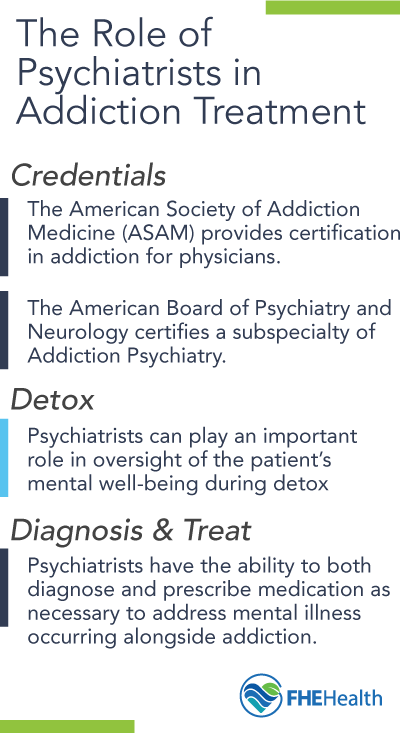Studies show that about 50 percent of people who suffer from mental health conditions also abuse drugs, alcohol, or both. The same source reports that 53 percent of people who abuse drugs or alcohol have at least one documented mental disorder. It’s clear that co-occurring mental health conditions and substance use disorders are extremely common. Psychiatric care can help.
The National Institute on Drug Abuse (NIDA) reports that the total number of adults with co-occurring disorders in the United States is roughly 7.7 million. Of this number, less than 10 percent get the treatment they need for both disorders, and almost a quarter reported that they didn’t know where to go to find this treatment.
Need Help?
Treatment can begin quickly and discreetly, get started now
The Demand for Psychiatric Care in Addiction Treatment
The ability for patients with co-occurring conditions to get help for both conditions at once is an invaluable resource, but psychiatric care has a role in effective treatment for all patients, whether they are part of that 7.7 million with co-occurring disorders or not.
Physical recovery from addiction happens much quicker than mental recovery, which often requires long-term psychiatric care. It takes much less time to rid the body of a chemical dependency than to rewire your process of decision making and understand the contributing factors. That’s why programs that use detox as their only focus are often unsuccessful: Putting patients back into society after detox means that they are momentary “clean,” but the main causes of the addiction were never addressed.
Long-term, heavy exposure to drugs and alcohol cause numerous dysfunctions in the brain function of patients suffering from addiction. Addiction completely rewires the reward centers of the brain, and decision-making is severely affected by long-term substance abuse.

Addiction is now commonly accepted as a mental health issue and several medical bodies are contributing to its integration. As part of its new commitment to a “Collaborative Care Model”, the American Psychiatric Association (APA) secured a grant of nearly 3 million dollars from the Centers for Medicare and Medicaid Services to better prepare physicians to handle co-occurring disorders.
Begin your recovery today
Ready to start? More questions about treatment?
Inpatient Psychiatric Services
FHE Health (FHE) is committed to serving each and every addict that enters our facility with treatment and psychiatric care that holds up to the highest standards in the industry.
Comprehensive, Collaborative Care
Our commitment to our clients involves approaching addiction from every angle and finding the combination of treatments and services that best support an individual client’s recovery. In our years of experience, we understand how latent mental issues can present themselves, and we are prepared to not just diagnose but treat the issues on-site. We use tenets of psychiatric care in combination with traditional addiction treatment strategies. Providing comprehensive services can give our clients a better odds of sustained recovery.
Psychiatric Therapies
We offer a variety of mental health therapies that help to address the treatment needs of addiction. These include proven behavioral treatments like cognitive behavioral therapy (CBT), in which our trained psychiatric staff carries out tests to better understand an individual client’s priorities and values and then provide individualized psychiatric care.
We utilize our state-of-the-art NeuroRehab services to identify the neural function of our patients and to measure, in quantifiable results, their progress through their treatment. This process removes the subjective assessment of patients and creates verifiable numbers to show improvement.
Full Support Along the Continuum
At FHE, we provide a continuum of care, wherein clients will benefit from our onsite psychiatric care in each of these steps:
- Detox: During medically-assisted detox, medical professionals oversee a client’s detoxification from addictive substances, and psychiatric care may be used to help manage withdrawal symptoms.
- Inpatient: During intensive inpatient and residential treatment, psychiatric care plays a significant role. Access to mental health treatment for co-occurring disorders takes place here, and all clients have time to work with mental health professionals.
- Outpatient: Through partial hospitalization and our intensive outpatient program, patients continue to engage with therapists and may utilize our outpatient neuro-rehab services.
During your entire stay with FHE, we work to give you access to medical and psychiatric care based on your unique needs and circumstances.
Specialized Mental Health Track
At FHE Health, we also offer specialized mental health programs to treat these issues in conjunction with substance abuse disorder. This program treats clients suffering from the following disorders:
During this specialized program, we offer psychiatric care around-the-clock on an inpatient and outpatient basis, as well as medication management and other specialized treatment that address the complex needs of people with mental health disorders, particularly those who suffer from both a substance use and mental health disorder.
This program is approved by the American Health Care Association (AHCA).
Learn More About Our Psychiatric Care
If you’re looking for mental health services offered from the perspective of addiction treatment specialists, you can find it here. 7.7 million adults in the U.S. are struggling with co-occurring disorders, and countless more can benefit from psychiatric care integration in the continuum of care offered at FHE Health. To learn more, contact us today.
Begin Your Recovery Today
Begin your recovery today
Ready to start? More questions about treatment?
Ready to Make a Change?
We understand that the treatment process can be difficult at times. At FHE, we are committed to assisting you in making progress towards a new life free from the grips of addiction.
Call Us Now:
(833) 596-3502









